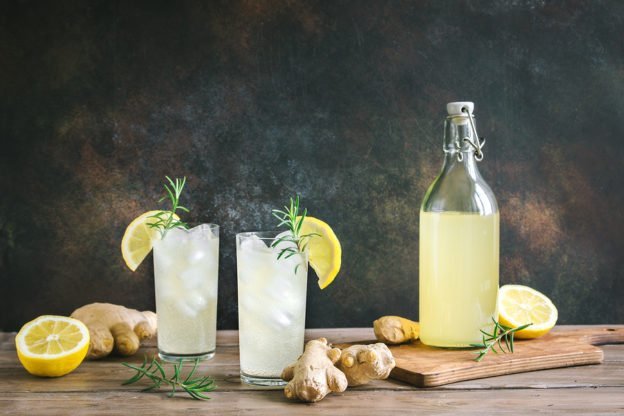By David Blyweiss, M.D., Advanced Natural Wellness
June 28, 2019
I’ve noticed an odd thing over the years.
When it comes to choosing something to drink besides water, a lot of folks have no idea what constitutes a healthy beverage.
For example, in my practice I’ve noticed that most “healthy” choices made by my patients include milk, juice and diet soda.
Cow’s milk is not intended for humans. And while the American dairy industry markets milk as a way to build strong bones, the truth is that people who drink milk regularly are more likely to experience fractures. Higher milk intake is associated with cardiovascular disease, cancer, early death and higher levels of inflammation.
Fruit juice definitely sounds healthy. But most juices are missing all of the fiber and other stuff that help your body process the high amounts of sugar found in many of today’s commercial fruit juices. If your body can’t process the sugar, it pretty much defeats any potential health benefits. Just take a look at how some of today’s popular juices stand up against soft drinks when it comes to sugar levels:
| 12 Ounce Serving | Sugar/Grams | Calories | 12 Ounce Serving | Sugar/Grams | Calories |
| Mott’s Apple Juice | 42 | 180 | Coca Cola | 39 | 140 |
| Simply Orange Juice | 35 | 165 | Pepsi with Real Sugar | 40 | 150 |
| Naked Juice + Probiotics | 42 | 221 | Dr Pepper | 40 | 150 |
| Snapple Grape Juice | 42 | 177 | 7-Up | 38 | 140 |
Not much difference, right?
And as far as vegetable juice is concerned, most of them are drowning in salt. (Fact: A can of V8 juice or Campbell’s tomato juice both contain more sodium than a large order of fries from Burger King.)
When it comes to diet beverages, I can’t tell you enough about the dangers associated with them. They’re promoted as weight loss aids, but that’s not the case. The fact is, the artificial sweeteners found in low- and no-calorie drinks actually promote weight gain, obesity and type 2 diabetes.
Open your arteries, improve blood flow for a new health miracle...
Did you know your circulatory system has over 60,000 miles of arteries, veins and other blood vessels, if stretched end to end?
But as you age, your blood vessels undergo changes, which may cause them to stiffen, thicken and get clogged.
GOOD NEWS! Doctors have now identified a “Miracle Molecule” inside your arteries that helps OPEN your arteries and IMPROVE blood flow.
It’s what Dr. Valentin Fuster calls it, "One of the most important discoveries in the history of cardiovascular medicine."To you, that means...
- Healthy blood pressure
- Sharper mind and memory
- Skyrocketing energy and muscular strength
- Increased pleasure and passion in the bedroom
- Improved circulation to every cell and organ in your body
Go here to discover a new natural way to significantly boost the levels of this miracle molecule in YOUR body NOW!
The artificial sweeteners in diet beverages are also linked to higher incidence of high blood pressure, cardiovascular events, stroke and dementia.
That being said, today I would like to introduce you to five healthy alternatives that you can drink every day, all day long.
My Top 5 Beverages (that aren’t Water)
for Your Good Health
Green tea is one of my favorite beverages. You can drink it hot or cold, and it makes a great replacement for coffee and sodas. Plus, it comes with a whole host of health benefits.
It slashes the risk of diabetes, reduces arterial stiffness, lowers the chance of a stroke and helps protect against cardiovascular death. Women who enjoy one to three cups of tea daily have greater bones density than women who aren’t tea-drinkers. Plus, green tea drinkers have telomeres that are about five years younger than people who don’t drink it.
Pomegranate juice cuts oxidation of LDL cholesterol, lowers blood pressure, reduces arterial plaque and helps prevent your arteries from thickening. Additionally, it can increase your antioxidant status by about 130%, which can help cut down on inflammation.
In men, pomegranate juice reduces PSA production, slows PSA doubling time, and lowers levels of inflammation that put you at risk for prostate cancer. It also stops cancer cells from spreading, and may even help kill them off.
Montmorency cherry juice also helps to protect your cardiovascular health by lowering blood pressure, inflammation and levels of oxidative stress.
As an added benefit, patients with mild to moderate dementia show improvements when tart cherry juice is added to their diet. They show greater verbal fluency, better short-term memory and enhanced long-term memory
Additionally, both pomegranate and montmorency cherry juice help to raise your levels of nitric oxide, or NO. This compound keeps your blood vessels open, relaxed and functioning properly. It’s absolutely essential when it comes to keeping blood flowing freely throughout your body.
Cranberry juice is another heart healthy juice. It significantly decreases levels of a protein that increases number of small, dense LDL particles. (These are the ones that cause plaque to build up in your blood vessels and create blockages.)
Not only does cranberry juice help to keep your LDL particles large and harmless. It also reduces inflammatory markers and works to lower blood pressure.
But here’s the thing. While all of these juices are great alternatives, they only work if you buy the unsweetened versions in the form of a “concentrate”. (Don’t worry. You can mix them with water and sweeten them up with stevia when you get home. Stevia is a safe, healthy alternative to sugar and sugar substitutes and the only sweetener I recommend to my patients.)
Are You Suffering From...
- Love handles and a pot belly
- Romance that isn't what it used to
- Forgetfulness and inattention
- Low (or no) strength and endurance
- A sex drive that's shifted into neutral...or worse
If so...you may have Mature Male Burnout. Click here to discover more about this unique condition and what you can do about it.
Kombucha is a slightly fizzy, fermented tea that can make a fantastic soda replacement. It has probiotic properties that help balance and diversify your gut microbiome. And since the microbes in your gut play an important part in all aspects of your mental and physical health, kombucha is an excellent choice of beverage.
If you’re skeptical, I urge you to try a few different brands before dismissing the idea. (If you’ve tried it before and didn’t like it, try it again.)
Here’s why:
Some brands can be tart, sour or vinegary. But other brands are surprisingly light, sweet and refreshing… and tremendously easy to drink. My favorite is Ginger Ade from GTS in the fridge section of Costco.
If you aren’t into kombucha yet, I recommend starting off with a milder brand like KeVita Master Brew, Health-Ade or Humm. Later on you can get more adventurous and test out brands with sharper and tangier flavors associated with traditional kombucha.
SOURCES:
Michaëlsson K, et al. Milk intake and risk of mortality and fractures in women and men: cohort studies. BMJ. 2014 Oct 28;349:g6015.
Fagherazzi G, et al. Chronic Consumption of Artificial Sweetener in Packets or Tablets and Type 2 Diabetes Risk: Evidence from the E3N-European Prospective Investigation into Cancer and Nutrition Study. Ann Nutr Metab. 2017;70(1):51-58.
Azad MB, et a. Nonnutritive sweeteners and cardiometabolic health: a systematic review and meta-analysis of randomized controlled trials and prospective cohort studies. CMAJ. 2017 Jul 17; 189(28): E929–E939.
Pase MP, et al. Sugar- and Artificially Sweetened Beverages and the Risks of Incident Stroke and Dementia – A Prospective Cohort Study. Stroke. 2017 May;48(5):1139-1146.
Iso H, et al. The relationship between green tea and total caffeine intake and risk for self-reported type 2 diabetes among Japanese adults. Ann Intern Med. 2006;144:554–62.
Hegarty VM, et al. Tea drinking and bone mineral density in older women. Am J Clin Nutr. 2000;71:1003–7.
Lin QF, et al. A Cross-sectional Study of the Relationship Between Habitual Tea Consumption and Arterial Stiffness. J Am Coll Nutr. 2016 May-Jun;35(4):354-61.
Arab L, et al. Green and black tea consumption and risk of stroke: a meta-analysis. Stroke. 2009;40:1786–92.
Kuriyama S, et al. Green tea consumption and mortality due to cardiovascular disease, cancer, and all causes in Japan: the Ohsaki study. JAMA. 2006 Sep 13;296(10):1255-65.
Chan R. Chinese tea consumption is associated with longer telomere length in elderly Chinese men. British Journal of Nutrition. 2010;103:107-113.
Aviram M, et al. Pomegranate juice consumption for 3 years by patients with carotid artery stenosis reduces common carotid intima-media thickness, blood pressure and LDL oxidation. Clin Nutr. 2004;23(3):423-433.
Pantuck AJ, et al. Phase II study of pomegranate juice for men with rising prostate-specific antigen following surgery or radiation for prostate cancer. Clin Cancer Res. 2006 Jul 1;12(13):4018-26.
Chai SC, Davis K, Zhang Z, Zha L, Kirschner KF. Effects of tart cherry juice on biomarkers of inflammation and oxidative stress in older adults. Nutrients. 2019;11(2).
Chai SC, Davis K, Wright RS, Kuczmarski MF, Zhang Z. Impact of tart cherry juice on systolic blood pressure and low-density lipoprotein cholesterol in older adults: a randomized controlled trial. Food & Function. 2018; 9(6):3185-3194.
Kent K, et al. Consumption of anthocyanin-rich cherry juice for 12 weeks improves memory and cognition in older adults with mild-to-moderate dementia. Eur J Nutr. 2017 Feb;56(1):333-341.
Trexler ET, et al. The effects of pomegranate extract on blood flow and running time to exhaustion. Appl Physiol Nutr Metab. 2014 Sep; 39(9): 1038–1042.
Keane KM, et al. Effects of montmorency tart cherry (L. Prunus Cerasus) consumption on nitric oxide biomarkers and exercise performance. Scand J Med Sci Sports. 2018 Jul;28(7):1746-1756.
Shidfar F, et al. The effects of cranberry juice on serum glucose, apoB, apoA-I, Lp(a), and Paraoxonase-1 activity in type 2 diabetic male patients. J Res Med Sci. 2012 Apr;17(4):355-60.
Novotny JA, et al. Cranberry juice consumption lowers markers of cardiometabolic risk, including blood pressure and circulating C-reactive protein, triglyceride, and glucose concentrations in adults. J Nutr. 2015 Jun;145(6):1185-93.
Kozyrovska N, et al. Kombucha microbiome as a probiotic: A view from the perspective of post-genomics and synthetic ecology. Biopolymers and Cell. 2012;28(2):103-113.







